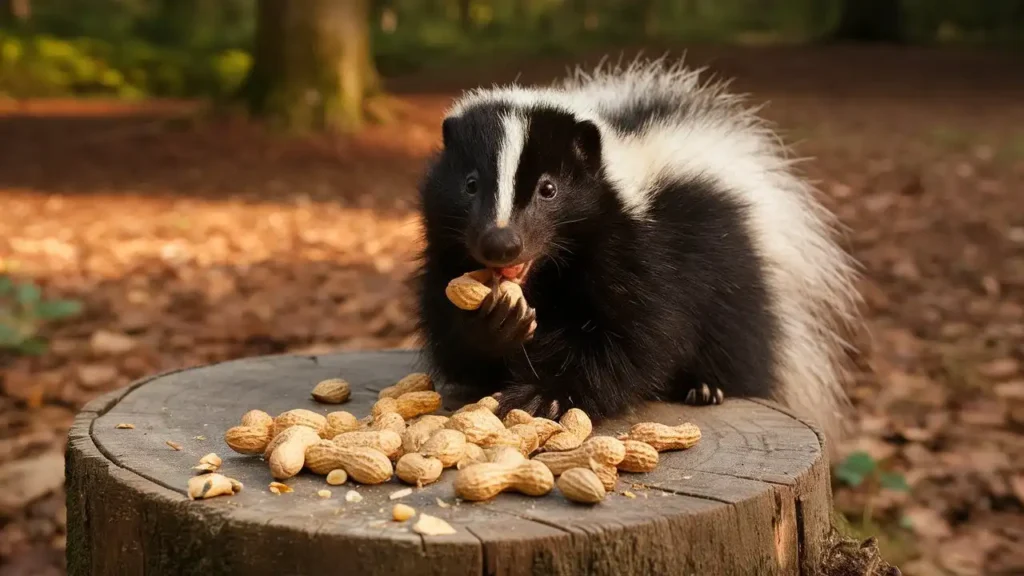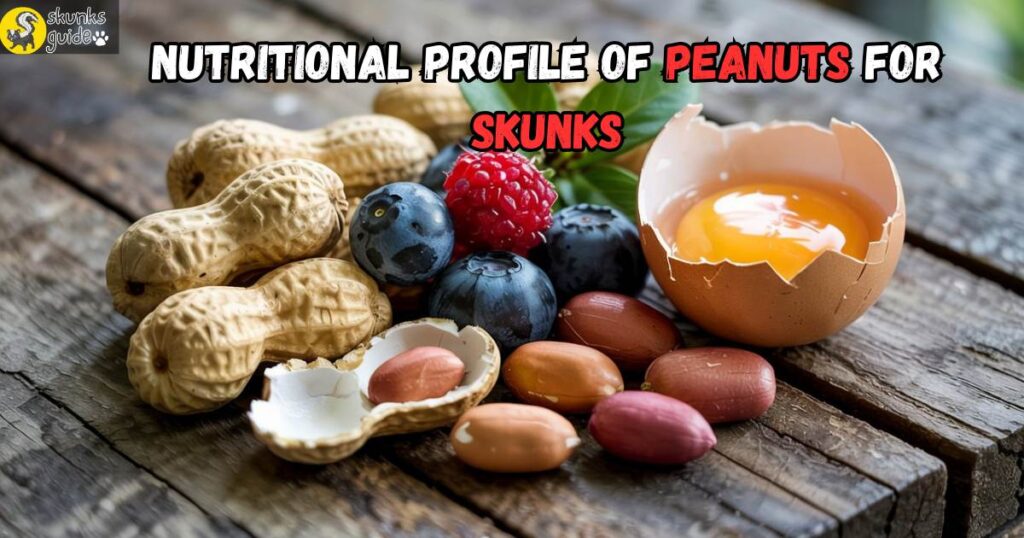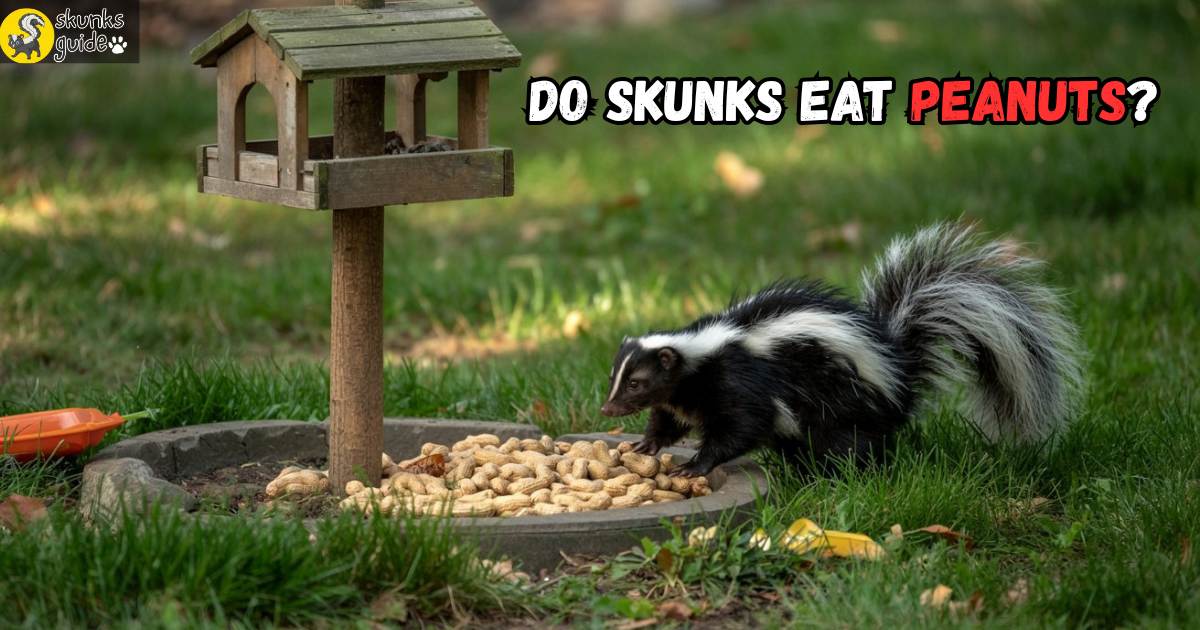Do Skunks Eat Peanuts?
Last updated on June 30th, 2025 at 11:35 am
Ever seen a skunk sniffing around your yard, eyeing… peanuts? These striped scavengers, known for raiding trash and gobbling grubs, have a surprising taste for nuts. As an urban wildlife watcher, I’ve caught skunks nibbling peanuts spilled from bird feeders, their curiosity as bold as their scent. Research confirms skunks are omnivorous opportunists, happily sampling peanuts in gardens or traps, though insects and berries remain their wild staples. For pet skunks, peanuts can be a treat—offering protein and fats—but they’re not nutritionally complete and shouldn’t replace a balanced diet. So, how do peanuts fit into a skunk’s menu, whether they’re wild foragers or pampered pets? Let’s explore this quirky culinary crossover and uncover the role peanuts play in their adventurous eating habits—moderation is key!
Do Skunks Eat Peanuts in the Wild?
In the wild, peanuts are not naturally part of a skunk’s diet. However, skunks are opportunistic feeders and may eat peanuts if they find them. Peanuts may attract wild skunks if they are left out in bird feeders, gardens, or as bait for other wildlife.
When Skunks Might Eat Peanuts in the Wild
- At Bird Feeders: Skunks often scavenge fallen peanuts from feeders.
- In Gardens: Peanut plants or discarded shells can catch their attention.
- As Bait: Peanuts are sometimes used to bait traps, making them accessible to skunks.
While peanuts are not a natural food source, skunks are curious animals that are willing to try new foods.
Can Pet Skunks Eat Peanuts?

Yes, pet skunks can eat peanuts in moderation as a treat. Peanuts are a source of protein and fat, but they are not nutritionally complete for skunks and should not replace their primary diet.
Benefits of Peanuts for Skunks
- Protein: Supports muscle health and energy.
- Healthy Fats: Provides energy and supports a shiny coat.
- Variety: Adds interest to their diet as an occasional snack.
Risks of Feeding Peanuts to Skunks
While peanuts are safe for skunks, there are some precautions to keep in mind:
- High Fat Content: Peanuts are calorie-dense and can contribute to obesity if overfed.
- Aflatoxins: Moldy peanuts can contain aflatoxins, which are harmful to skunks.
- Salt: Avoid salted or flavored peanuts, as excess salt can harm skunks.
How to Safely Feed Peanuts to Skunks
If you decide to offer peanuts to a pet skunk, it’s important to do so safely and sparingly.
Steps for Feeding Peanuts
Combine with Other Foods: Offer peanuts alongside fruits, vegetables, and protein sources for a balanced diet.
Choose Unsalted, Raw, or Unshelled Peanuts: Avoid flavored or salted varieties.
Moderation: Limit peanuts to a small treat, such as 1-2 whole peanuts or a tablespoon of crushed peanuts.
Monitor for Allergies: Watch for signs of food sensitivities, such as diarrhea or changes in behavior.

Nutritional Profile of Peanuts for Skunks
Peanuts are rich in nutrients that can complement a skunk’s diet when offered as a treat.

Key Nutrients
- Protein: Essential for growth and repair.
- Healthy Fats: Provides energy and supports a healthy coat.
- Vitamin E: Acts as an antioxidant.
- B Vitamins: Supports energy metabolism.
However, peanuts lack certain nutrients that skunks require, such as calcium and specific amino acids, so they should not replace their primary diet.
Wild Skunks and Peanut Attraction
Wild skunks are opportunistic feeders, so they might be drawn to areas where peanuts are available. If you feed birds or other wildlife, skunks might visit your yard for leftovers.
Tips to Manage Peanut Attraction
- Clean Up Bird Feeders: Prevent skunks from scavenging by cleaning up spilled peanuts or seeds.
- Secure Storage: Store peanuts in airtight containers to avoid attracting wildlife.
- Fence Your Yard: A small fence can help deter skunks from accessing areas where peanuts or other food sources are left out.
Alternative Treats for Skunks
If you’re considering peanuts as a treat for your pet skunk, you might also explore other healthy options:
- Fruits: Berries, apples, melons.
- Vegetables: Sweet potatoes, carrots, green beans.
- Proteins: Boiled eggs, cooked chicken, or plain insects like mealworms.
These alternatives can provide variety while offering balanced nutrition.
Conclusion
So, do skunks eat peanuts? Yes, they can, but peanuts are not a staple in their diet. Whether in the wild or as pets, skunks may enjoy peanuts as an occasional treat. For pet skunks, ensure the peanuts are raw, unsalted, and free of additives. Remember, moderation is key to keeping your skunk healthy and happy. Understanding their dietary needs ensures that skunks thrive, whether they are wandering through your yard or enjoying life as a cherished pet.
Frequently Asked Questions
Skunks eat various nuts, including acorns, walnuts, and hazelnuts as part of their diet. They forage for these nuts on the ground
Skunks are attracted to backyards by accessible food sources like garbage, pet food, and gardens. Shelter opportunities, such as woodpiles and decks, also draw them in.
Skunks primarily feast on insects, larvae, grubs, and earthworms. They also enjoy fruits, nuts, small mammals, and amphibians.

